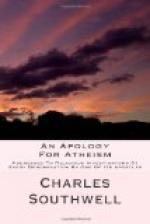The knot of old fashioned politicians who call themselves Young England, are enamoured of ‘graceful superstition.’ Alarmed at the march of reason, and admirers of ‘blind faith in mystery,’ they sigh for a renewal of those times when no one doubted the propriety of drowning witches, or being touched for the king’s evil. Cui bono is the question repeatedly put to the proselytising Atheist by this modern antique class of persons, who cannot see the utility of destroying the vital principle of all religions. But if that principle is false, no sane man can doubt the expediency of proving it so. Falsehood may be useful to individuals, but cannot tend to the moral and political advancement of nations. Apologists of error find the presumed unfitness of their fellow creatures to appreciate truth a sufficient reason for not teaching it. To raise up the populace to their own intellectual level they deem impracticable, and therefore speak down to their lowest passions and prejudices: like Varro they contend there are some truths the vulgar had better think falsehoods, and many falsehoods they had better think truths. The consequences of such ‘moral swindling’ are everywhere visible: on all sides superstition, wild, unreasoning, senseless superstition rears its hateful front, and vomits forth anathema on the friend of progress, humanity, and social justice. Look at Ireland: see to what a Pandaemonium superstition has converted ’the first flower of the land and first gem of the sea.’ In that unhappy country may be seen seven or eight millions of people cheated, willingly defrauded of their substance, by a handful of designing priests, who, dead to shame, erect the most stupid credulity into exalted virtue —battle in support of ignorance because knowledge is incompatible with their ‘blood-cemented pyramid of greatness,’ and to aggrandise themselves, perpetuate the vilest as well as most palpable delusions that ever assumed the mask of divine truth. Daniel O’Connell may object to have them called ‘surpliced ruffians,’ not so the philosopher, who sees in pious fraud on a gigantic scale, the worst species of ruffianism that ever disgraced the earth.
These are no new tangled or undigested notions. From age to age the wisest among men have abhorred and denounced superstition. It is true that only a small section of them treated religion as if necessarily superstition, or went quite so far as John Adams, who said, this would be the best of all possible worlds if there were no religion in it. But an attentive reading of ancient and modern philosophical books has satisfied the Author of this Apology that through all recorded time, religion has been tolerated rather than loved by great thinkers, who had will, but not power to wage successful war upon it. Gibbon speaks of Pagan priests who, ’under sacerdotal robes, concealed the heart of an Atheist.’ Now, these priests were also the philosophers of Rome, and it is not impossible that some modern philosophical priests, like their Pagan prototypes, secretly despise the religion they openly profess. Avarice, and lust of power, are potent underminers of human virtue. The mighty genius of Bacon was not proof against them, and he who deserves to occupy a place among ‘the wisest and greatest’ has been ‘damned to eternal fame’ as the, ‘meanest of mankind.’




